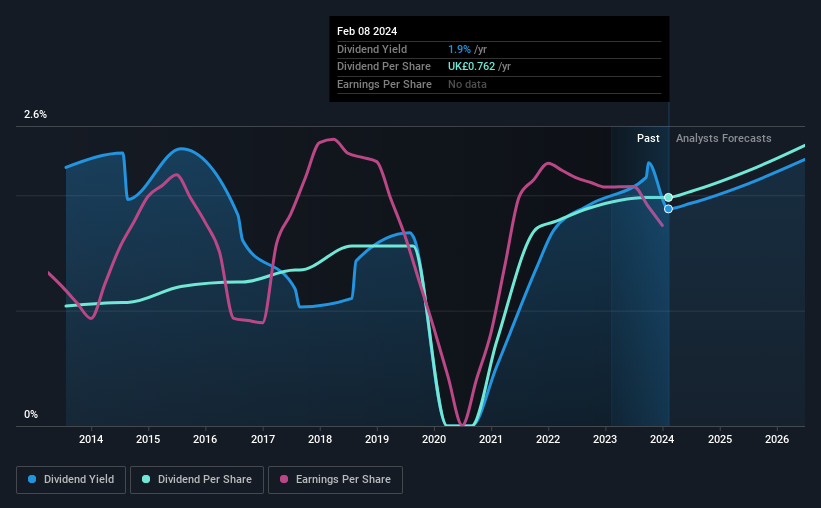Renishaw (LON:RSW) Has Announced A Dividend Of £0.168
Renishaw plc (LON:RSW) will pay a dividend of £0.168 on the 9th of April. This payment means that the dividend yield will be 1.9%, which is around the industry average.
While the dividend yield is important for income investors, it is also important to consider any large share price moves, as this will generally outweigh any gains from distributions. Investors will be pleased to see that Renishaw's stock price has increased by 33% in the last 3 months, which is good for shareholders and can also explain a decrease in the dividend yield.
Check out our latest analysis for Renishaw
Renishaw's Payment Has Solid Earnings Coverage
Solid dividend yields are great, but they only really help us if the payment is sustainable. Based on the last dividend, Renishaw is earning enough to cover the payment, but then it makes up 410% of cash flows. The company might be more focused on returning cash to shareholders, but paying out this much of its cash flow could expose the dividend to being cut in the future.
Looking forward, earnings per share is forecast to rise by 40.6% over the next year. If the dividend continues along recent trends, we estimate the payout ratio will be 43%, which is in the range that makes us comfortable with the sustainability of the dividend.

Dividend Volatility
The company's dividend history has been marked by instability, with at least one cut in the last 10 years. Since 2014, the dividend has gone from £0.40 total annually to £0.762. This works out to be a compound annual growth rate (CAGR) of approximately 6.7% a year over that time. It's good to see the dividend growing at a decent rate, but the dividend has been cut at least once in the past. Renishaw might have put its house in order since then, but we remain cautious.
Dividend Growth May Be Hard To Come By
With a relatively unstable dividend, it's even more important to see if earnings per share is growing. Over the past five years, it looks as though Renishaw's EPS has declined at around 5.4% a year. If the company is making less over time, it naturally follows that it will also have to pay out less in dividends. However, the next year is actually looking up, with earnings set to rise. We would just wait until it becomes a pattern before getting too excited.
The Dividend Could Prove To Be Unreliable
In summary, while it's good to see that the dividend hasn't been cut, we are a bit cautious about Renishaw's payments, as there could be some issues with sustaining them into the future. While the low payout ratio is a redeeming feature, this is offset by the minimal cash to cover the payments. We don't think Renishaw is a great stock to add to your portfolio if income is your focus.
It's important to note that companies having a consistent dividend policy will generate greater investor confidence than those having an erratic one. Meanwhile, despite the importance of dividend payments, they are not the only factors our readers should know when assessing a company. Without at least some growth in earnings per share over time, the dividend will eventually come under pressure either from competition or inflation. Very few businesses see earnings consistently shrink year after year in perpetuity though, and so it might be worth seeing what the 6 analysts we track are forecasting for the future. Is Renishaw not quite the opportunity you were looking for? Why not check out our selection of top dividend stocks.
New: AI Stock Screener & Alerts
Our new AI Stock Screener scans the market every day to uncover opportunities.
• Dividend Powerhouses (3%+ Yield)
• Undervalued Small Caps with Insider Buying
• High growth Tech and AI Companies
Or build your own from over 50 metrics.
Have feedback on this article? Concerned about the content? Get in touch with us directly. Alternatively, email editorial-team (at) simplywallst.com.
This article by Simply Wall St is general in nature. We provide commentary based on historical data and analyst forecasts only using an unbiased methodology and our articles are not intended to be financial advice. It does not constitute a recommendation to buy or sell any stock, and does not take account of your objectives, or your financial situation. We aim to bring you long-term focused analysis driven by fundamental data. Note that our analysis may not factor in the latest price-sensitive company announcements or qualitative material. Simply Wall St has no position in any stocks mentioned.
About LSE:RSW
Renishaw
An engineering and scientific technology company, designs, manufactures, distributes, sells, and services technological products and services, and analytical instruments and medical devices worldwide.
Flawless balance sheet average dividend payer.
Similar Companies
Market Insights
Community Narratives



